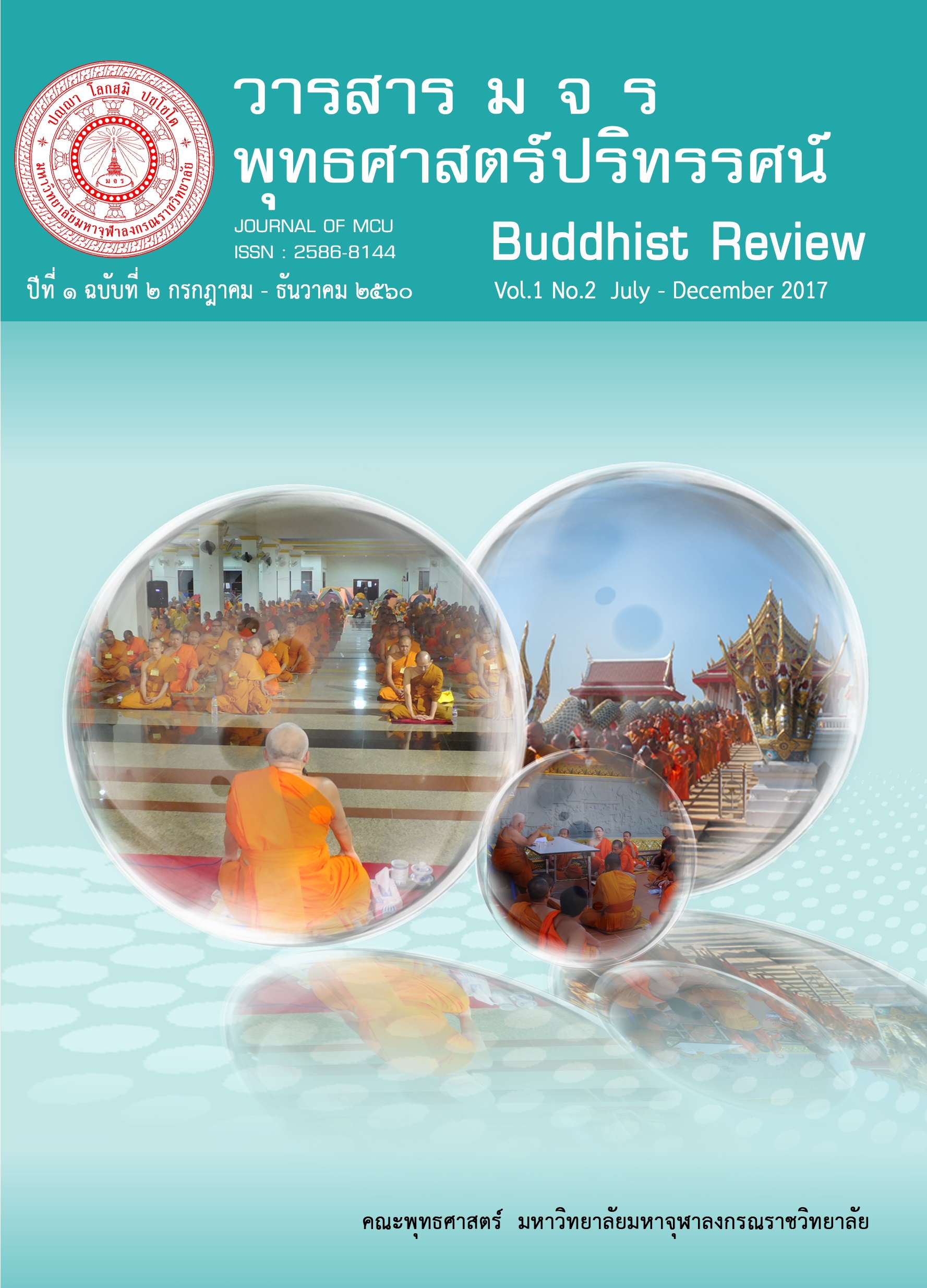พุทธวิธีทำใจในยามสูญเสีย
Main Article Content
บทคัดย่อ
การสูญเสียเป็นสิ่งที่ทุกคนต้องเจอ คนจานวนมากที่เกิดความทุกข์จากการสูญเสียเพราะทำใจยอมรับไม่ได้ บทความวิชาการนี้ได้ศึกษาวิธีการนำพระพุทธศาสนามาแก้ที่ต้นเหตุของการเกิดความทุกข์นั้น โดยได้อธิบายถึงพุทธวิธีการทำใจในยามสูญเสียว่า พระพุทธศาสนาเป็นพุทธวิธีที่เป็นยารักษาโรคทางใจได้ดีที่สุด เพราะความทุกข์นั้นมีอยู่ตั้งแต่เกิดจนตาย พุทธศาสนาสอนให้รู้จักทุกข์ ให้เรียนรู้และเข้าใจในทุกข์ แล้วหาเหตุที่ทาให้เกิดทุกข์ และหาหนทางแห่งการดับทุกข์ ด้วยการกลับไปแก้ตรงเหตุที่ทาให้เกิดทุกข์นั้น และทำใจยอมรับกับสิ่งที่เกิดขึ้น รู้จักที่จะวางใจกับเรื่องที่ต้องประสบในแต่ละวันของชีวิต ฝึกให้มีสติอยู่กับปัจจุบัน เพื่อเสริมสร้างเป็นความคิดที่ดี คำพูดที่ถูกต้อง และการกระทำที่ดีงาม การที่บุคคลทั้งหลายได้น้อมนำเอาคาสอนของพระพุทธเจ้ามาปฏิบัติ ก็มาจากการมีเพื่อนที่ดีเป็นกัลยาณมิตรที่คอยแนะนาชี้ทางในข้อธรรมคำสอนของพระพุทธเจ้า เช่น หลักไตรลักษณ์ มรณานุสสติ สติปัฏฐาน เป็นต้น เมื่อน้อมนำธรรมเหล่านี้มาปฏิบัติตาม สามารถทำให้มีสติรู้เท่าทันกับปัจจุบันมากขึ้น เป็นการช่วยบรรเทาความทุกข์ ช่วยบำบัดจิตใจของคนให้คลายจากทุกข์ ให้สามารถดูแลสภาพจิตใจของตนเอง และบรรเทาความทุกข์ลงได้ จากความเข้าใจในธรรมชาติของชีวิต ที่เห็นการเกิดขึ้น ตั้งอยู่ และดับไปของสรรพสิ่งทั้งหลาย ตามแนวทางการปฏิบัติสมถกรรม-ฐาน ที่ฝึกจิตให้มีความสงบ เพื่อเป็นการลดจากความคิดฟุ้งซ่าน และลดอารมณ์ความเศร้าโศกเสียใจต่างๆ ที่ทาให้เกิดทุกข์ และวิปัสสนากรรมฐาน ที่ฝึกการคลายความยึดถือ มายอมรับความจริงที่เกิดขึ้นในปัจจุบัน นำมาปรับใช้ให้เข้ากับการดำเนินชีวิตประจาวันได้ ดังนั้น พระพุทธศาสนาจึงเป็นยาบำบัดจิตใจของคนได้ดีที่สุด
Article Details
- บทความที่ได้รับการตีพิมพ์เป็นลิขสิทธิ์ของวารสาร มจร พุทธศาสตร์ปริทรรศน์
- ข้อความใดๆ ที่ปรากฎในบทความที่ได้รับการตีพิมพ์ในวารสาร ถือเป็นความรับผิดชอบของผู้เขียนบทความ และข้อคิดเห็นนั้นไม่ถือว่าเป็นทัศนะและความรับผิดชอบของกองบรรณาธิการวารสาร มจร พุทธศาสตร์ปริทรรศน์
เอกสารอ้างอิง
กัญญา บุญธรรมโม และคณะ. “ผลของการให้การปรึกษาร่วมกับการดูแลแบบประคับประคองต่อภาวะสูญเสียและเศร้าโศกของผู้ป่วยมะเร็งปอดระยะสุดท้าย”. ว.พยำบำลสงขลำนครินทร์. ปีที่ ๓๓ ฉบับที่ ๑ (มกราคม - เมษายน ๒๕๕๖).
พระเทพเจติยาจารย์ (หลวงพ่อวิริยังค์ สิรินฺธโร). หลักสูตรครูสมำธิ เล่ม ๑. พิมพ์ครั้งที่ ๗. กรุงเทพมหานคร : หจก.พิฆณี, ๒๕๕๔.
พระพรหมคุณาภรณ์ (ป.อ. ปยุตฺโต). พจนำนุกรมพุทธศำสตร์ ฉบับประมวลศัพท์. พิมพ์ครั้งที่ ๒๑. กรุงเทพมหานคร : สานักพิมพ์ผลิธัมม์, ๒๕๕๖.
พระพรหมคุณาภรณ์ (ป.อ. ปยุตฺโต). พุทธธรรม (ฉบับเดิม). พิมพ์ครั้งที่ ๑๑. กรุงเทพมหานคร : โรงพิมพ์ บริษัท สหธรรมิก จากัด, ๒๕๔๔.
พระพรหมคุณาภรณ์ (ป.อ. ปยุตฺโต). พุทธธรรม ฉบับปรับขยำย. พิมพ์ครั้งที่ ๓๒. กรุงเทพมหานคร : สานักพิมพ์ผลิธัมม์, ๒๕๕๕.
พระมหาทองมั่น สุทฺธจิตฺโต. คู่มือกำรเจริญสติปัฏฐำน. พิมพ์ครั้งที่ ๑๒. เชียงใหม่: บริษัทบุญศิริการ พิมพ์ จากัด, ๒๕๕๔.
พุทธทาสภิกขุ. ปฏิจจสมุปบำทกับอำนำปำนสติ. กรุงเทพมหานคร : สานักพิมพ์ธรรมสภา, ๒๕๔๙.
พระโสภณมหาเถระ (มหาสีสยาดอ). มหำสติปัฏฐำนสูตร. กรุงเทพมหานคร : ห้างหุ้นส่วนจากัด ประยูรสาส์นไทย การพิมพ์, ๒๕๕๕.
มหาจุฬาลงกรณราชวิทยาลัย. พระไตรปิฎกภำษำไทย ฉบับมหำจุฬำลงกรณรำชวิทยำลัย. กรุงเทพฯ : โรงพิมพ์มหาจุฬาลงกรณราชวิทยาลัย, ๒๕๓๙.
มหาจุฬาลงกรณราชวิทยาลัย. อรรถกถำภำษำไทย ฉบับมหำจุฬำลงกรณรำชวิทยำลัย. กรุงเทพมหานคร : โรงพิมพ์มหาจุฬาลงกรณราชวิทยาลัย, ๒๕๕๒.
แม่ชีสาลี สิงหรา. “ศึกษาสมาธิและปัญญาในการปฏิบัติวิปัสสนาภาวนา”. วิทยำนิพนธ์พุทธศำสตรมหำบัณฑิต สำขำวิชำวิปัสสนำภำวนำ. บัณฑิตวิทยาลัย : มหาวิทยาลัยมหาจุฬาลงกรณราชวิทยาลัย, ๒๕๕๖.
สุเมธ ตันติเวชกุล. “ตำมรอยพระยุคลบำท ครูแห่งแผ่นดิน”. กรุงเทพมหานคร : สานักพิมพ์แห่งจุฬาลงกรณ์มหาวิทยาลัย, พ.ศ. ๒๕๕๖.
สุภีร์ ทุมทอง. มรณสติในพระไตรปิฎก. กรุงเทพมหานคร : ห้างหุ้นส่วนจากัด ภาพพิมพ์, ๒๕๕๕.
หมอมีฟ้า, “ธรรมชำติของควำมรู้สึกต่อกำรสูญเสีย”, [ออนไลน์], แหล่งที่มา : เพจเฟสบุ๊ค สมาคมจิตแพทย์แห่งประเทศไทย; [๑๙ ต.ค. ๒๕๕๙].


